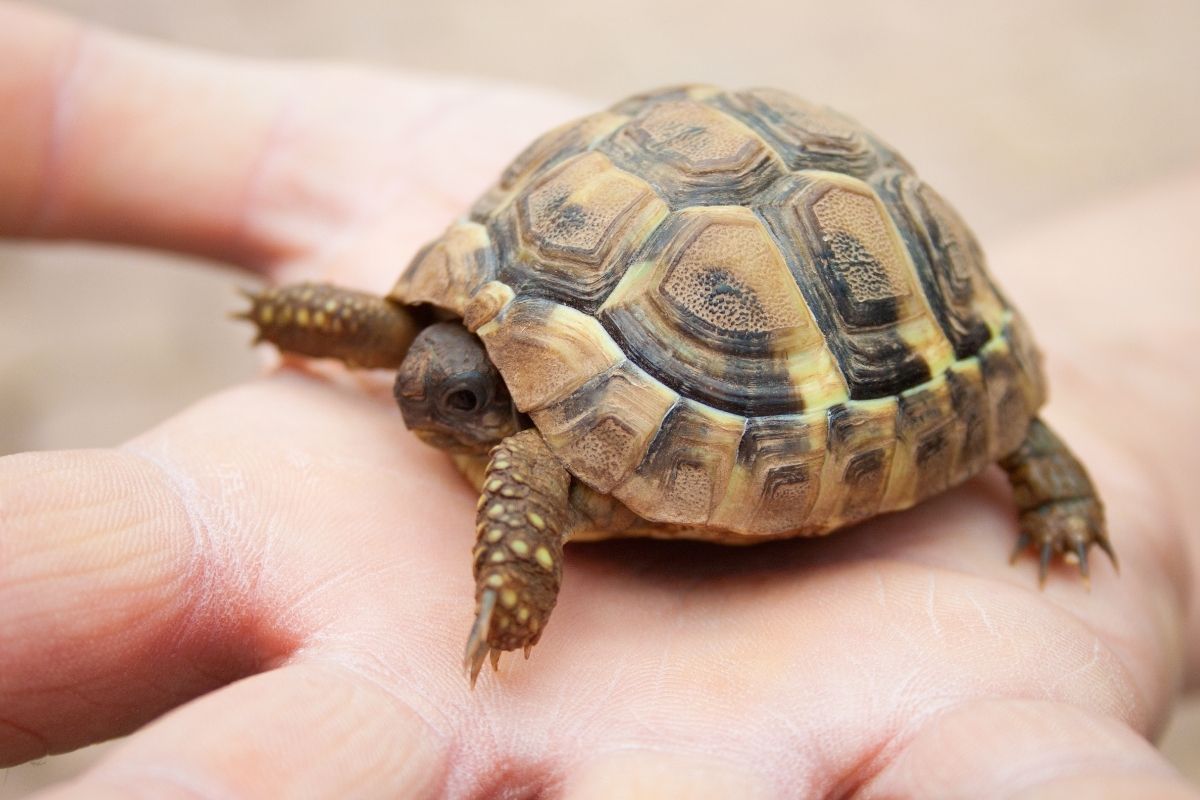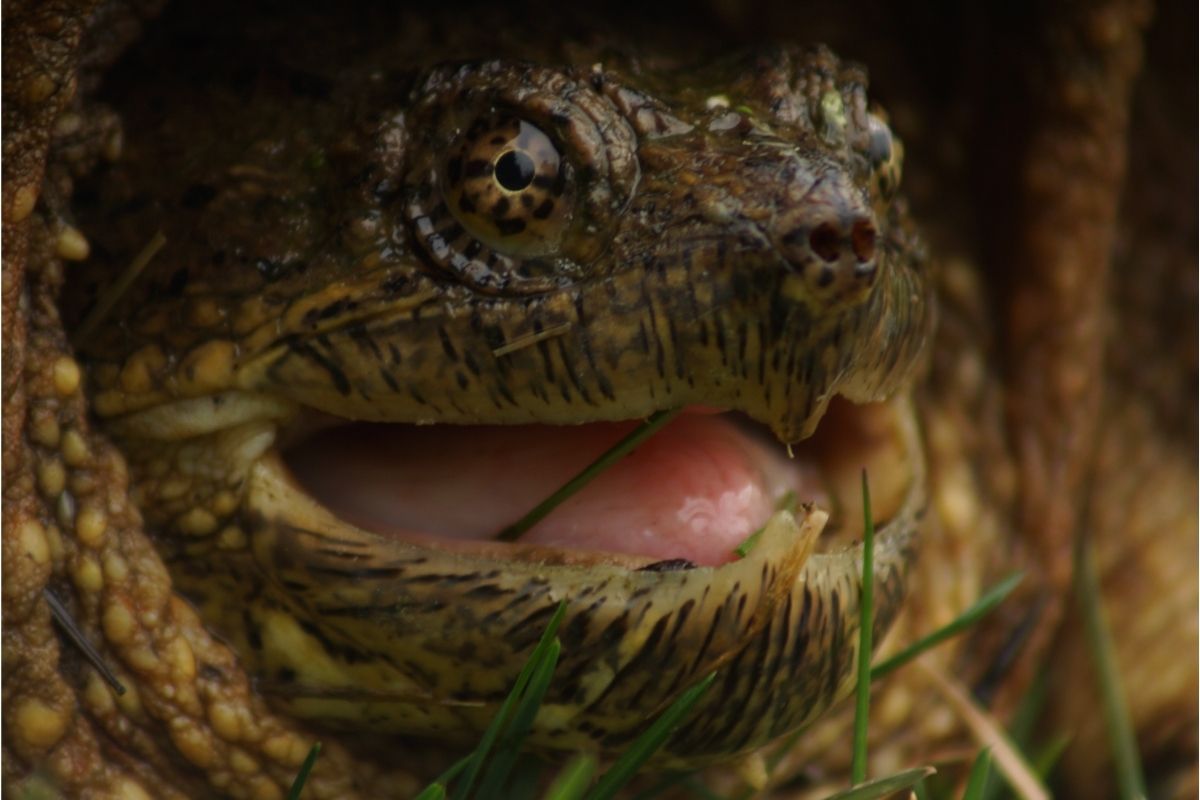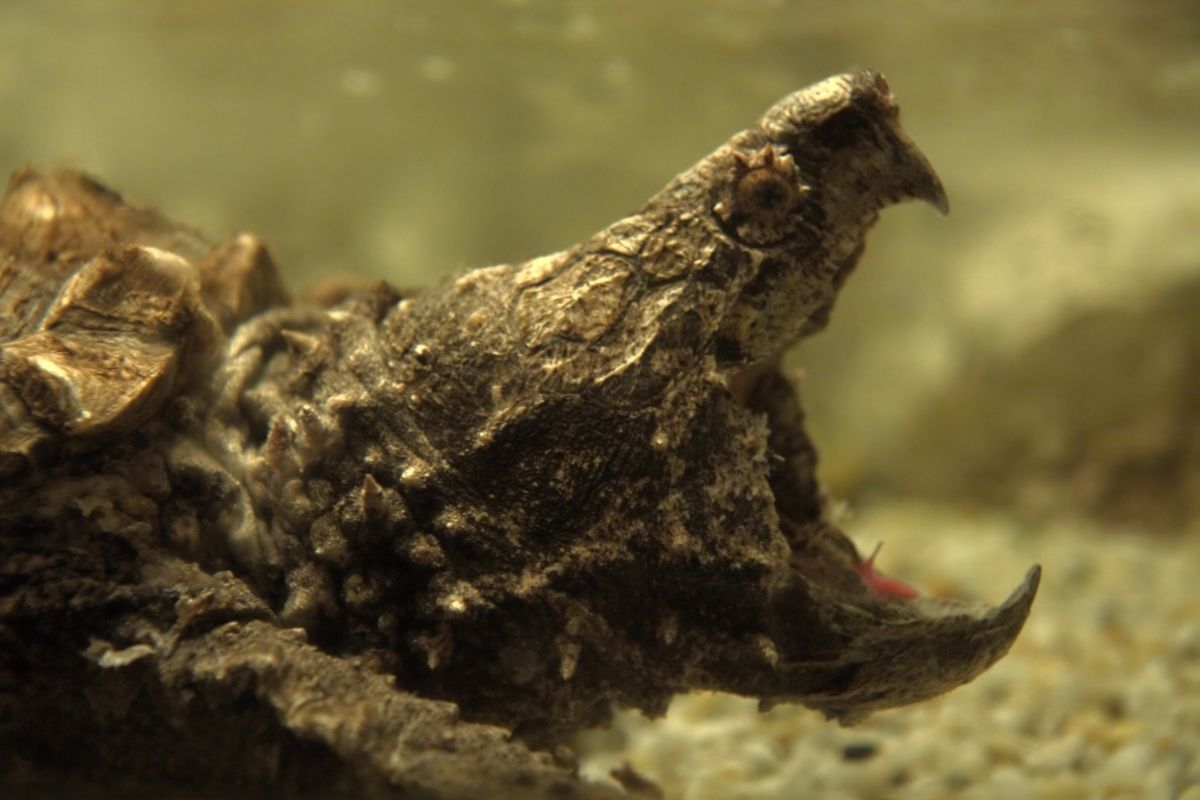Turtles are beautiful creatures that can teach us, as humans, a lot about the world and the many smaller ecosystems within it.
However, that doesn’t mean that every interaction between turtles and humans is necessarily positive.

Some turtles have been known to react aggressively when they feel threatened by humans or other animals. In these cases, they may attack, and the result can be unpleasant.
In this article, we’ll be finding out which turtle species may attack humans and what might prompt them to do so. We will also be giving you important advice about what to do if you are attacked by a turtle.
How Do Scared Turtles React?
Most of the time, when a turtle feels threatened, its first instinct is not to attack. Instead, a turtle is more likely to use its built-in defense mechanism: its shell.
Turtles are notoriously shy and don’t like to be handled much for the most part.
Therefore, when a human or another animal picks up a turtle, it will usually pull back into its shell by retracting its limbs and head. This way, it feels safer because its soft body is protected by the shell.
Another thing you might notice when you touch or pick up a turtle is a hissing noise.
We all know that cats hiss when they feel threatened, and some animal behaviorists theorize that this is actually an imitation of the noise a snake makes.
After all, most animals in the wild know to avoid snakes and will withdraw at the sound of a hiss.
Actually, the hissing noise a turtle might make when you pick it up is due to the fact that in order to get into their shells, turtles need to expel some air from their lungs.
Luckily for the turtle, though, many predators also recognize this sound as a warning and may decide to leave the animal alone.
If you have recently brought home a turtle as a pet, you may notice that it hisses a lot in the first few days.
The frequency will probably lessen over time, but it’s important to remember that turtles are not like cats and dogs, and they will most likely never be 100% comfortable being handled.
Why Might A Turtle Attack A Human?

So, if a turtle’s first defense mechanism is to retreat into its shell, what are the circumstances under which a turtle might attack a human?
Unfortunately, a turtle’s biting instinct can be quite unpredictable. Some turtles are naturally more aggressive than others, and while part of this can be determined by the species of the turtle, it’s also down to individual personality.
In most cases, a turtle will bite if it feels that withdrawing into its shell is not enough to protect itself. If you are handling your turtle very roughly, for example, it may understandably think that you intend to hurt it.
Also, if the turtle has put its head back into its shell, and you attempt to insert your fingers into the opening, you will probably get bitten.
It should be noted that some turtles find it more difficult than others to withdraw fully into their shells, and some species actually can’t withdraw all the way.
These are usually the turtles with longer necks. Logically, it makes sense that these turtles are more likely to bite humans and other animals because it is their only method of defense.
A wild turtle is more likely to bite a human than a pet turtle due to a lack of exposure to humans, although pet turtles may also bite their owners, especially soon after they are introduced to their new home.
Is A Turtle Bite Dangerous?
Whether a turtle bite is dangerous or not entirely depends on two factors: the species of the turtle and how hard the turtle bites.
A bite from a smaller turtle is unlikely to do significant damage. After all, turtles do not have teeth.
They do have jaws that are similar to beaks, but if the turtle is fairly small, it is unlikely to exert enough pressure through its jaw to deliver more than a small cut.
Being bitten by a large turtle, however, is a different story. Large turtles can bite with a lot of force, and their beak-like jaws can result in deep cuts that, in some cases, might require dressing or even stitches to heal.
Please bear in mind that a bite from a small turtle can still be dangerous even if the damage is minimal.
This is because turtles’ mouths are full of bacteria, including salmonella, which can be transmitted to your bloodstream through a bite, leading to serious infection.
Which Turtles Are A Threat To Humans?

Some turtle species are more likely to attack humans than others. Here are the likelihoods of being attacked by some of the most common species of turtle in the world:
Do Leatherback Turtles Bite Humans?
Leatherback turtles are large turtles with strong jaws, so being bitten by one of these turtles is no laughing matter.
Luckily, though, these turtles are gentle giants.
They are unlikely to bite humans unless they are being genuinely provoked, so respect this turtle’s space and body language, and you should be fine.
Will A Snapping Turtle Attack A Human?
A snapping turtle is one of the most likely turtle species to attack humans. These turtles are large with very strong jaws.
They are called snapping turtles because they bite so quickly. The reason for this is that they can’t fully withdraw into their shells, so they need to be able to defend themselves effectively.
Luckily, a snapping turtle is still unlikely to bite you unless you touch it or try to pick it up and hold it. Snapping turtles largely ignore humans and will only bite as a last resort.
Do Sliders Attack Humans?
Slider turtles, such as red-eared sliders and yellow-bellied sliders, are commonly kept as pets.
This is partly because they are some of the best-natured turtles and warm up to their owners quite quickly.
Therefore, they are not particularly likely to attack humans, although they may do so if provoked, just like any other turtle.
Can Sea Turtles Harm Humans?
Sea turtles are majestic and gentle creatures that are unlikely to do humans any harm. When they sense a human’s presence in the water, they will usually swim away rather than attack.
With that being said, these turtles will still protect themselves if they feel they need to do so.
If you invade a sea turtle’s space despite its efforts to get away from you, for example, it will probably bite you.
Because sea turtles are large and have powerful jaws, they can deliver a strong bite, resulting in bruising and even broken bones.
Are Box Turtles Dangerous To Humans?
Box turtles are especially shy, solitary creatures. They don’t particularly enjoy human interaction, so they will probably pull back into their shells when you approach.
The likelihood of being bitten by a box turtle is fairly low unless you handle them roughly.
Can A Tortoise Attack A Human?
Tortoises are not aggressive animals, and they don’t typically bite humans on purpose.
However, one thing to note about tortoises is that they are opportunistic eaters and their vision isn’t the best.
This means that you should be very careful when feeding them because they could mistake your finger for a tasty vegetable.
What Should You Do If A Turtle Attacks You?
The unfortunate thing about being bitten by a turtle is that when a turtle bites you, it will not relinquish its grip easily.
You won’t be able to force its jaws open, and if you try, you’re likely to get your other hand bitten as well.
The best thing to do if you have been attacked by a turtle is submerge the turtle in some water.
Turtles need to breathe air in order to get enough oxygen, so they can’t keep hold of you under the water forever and will eventually let go.
Obviously, you should make sure that any water you place your turtle into is safe for them. A saltwater turtle, for example, should not be placed in freshwater, and vice versa.
Once the turtle has released you, you should seek medical attention as soon as possible. If the wound is deep, it may need dressing at the hospital.
Even if the damage is minimal, you should still get medical care because it’s important to have the wound professionally cleaned to reduce the risk of infection.
Final Thoughts
Attacks on humans by turtles are not that uncommon. Some turtles are naturally more nervous or aggressive, especially if they can’t rely on their shells for full protection.
While turtles are more likely to avoid humans than attack them, they may still bite if they are feeling threatened.
The most likely turtles to seriously attack humans are snapping turtles. Tortoises may also bite, but this is usually due to mistaking fingers and toes for food.
To avoid being attacked by a turtle, respect the animal’s space. If you need to handle a turtle, do so gently and keep your hands away from its head.
If you are bitten by a turtle, submerge it in water to encourage it to let go and then seek medical attention promptly.
